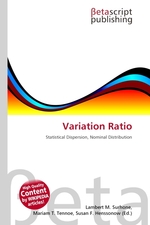Variation Ratio
Lambert M. Surhone, Miriam T. Timpledon, Susan F. Marseken
бумажная книга
High Quality Content by WIKIPEDIA articles! The variation ratio is a simple measure of statistical dispersion in nominal distributions; it is the simplest measure of qualitative variation. It is defined as the proportion of cases which are not the mode: mathbf{v} := 1 - frac{f_m}{N}. While a simple measure, it is notable in that some texts and guides suggest or imply that the dispersion of nominal measurements cannot be ascertained. It is defined for instance in (Freeman 1965). Just as with the range or standard deviation, the larger the variation ratio, the more differentiated or dispersed the data are; and the smaller the variation ratio, the more concentrated and similar the data are. For example, a group which is 55% female and 45% male has a proportion of 0.55 females and therefore variation ratio of (1.0- 0.55) = 0.45; and is more dispersed in terms of gender than a group which is 95% female and has a variation ratio of only 0.05. Similarly, a group which is 25% Catholic (where Catholic is the modal religious preference) has a variation ratio of 0.75 and is much more dispersed religiously than a group which is 85% Catholic and has a variation ratio of only 0.15.
Данное издание не является оригинальным. Книга печатается по технологии принт-он-деманд после получения заказа.


